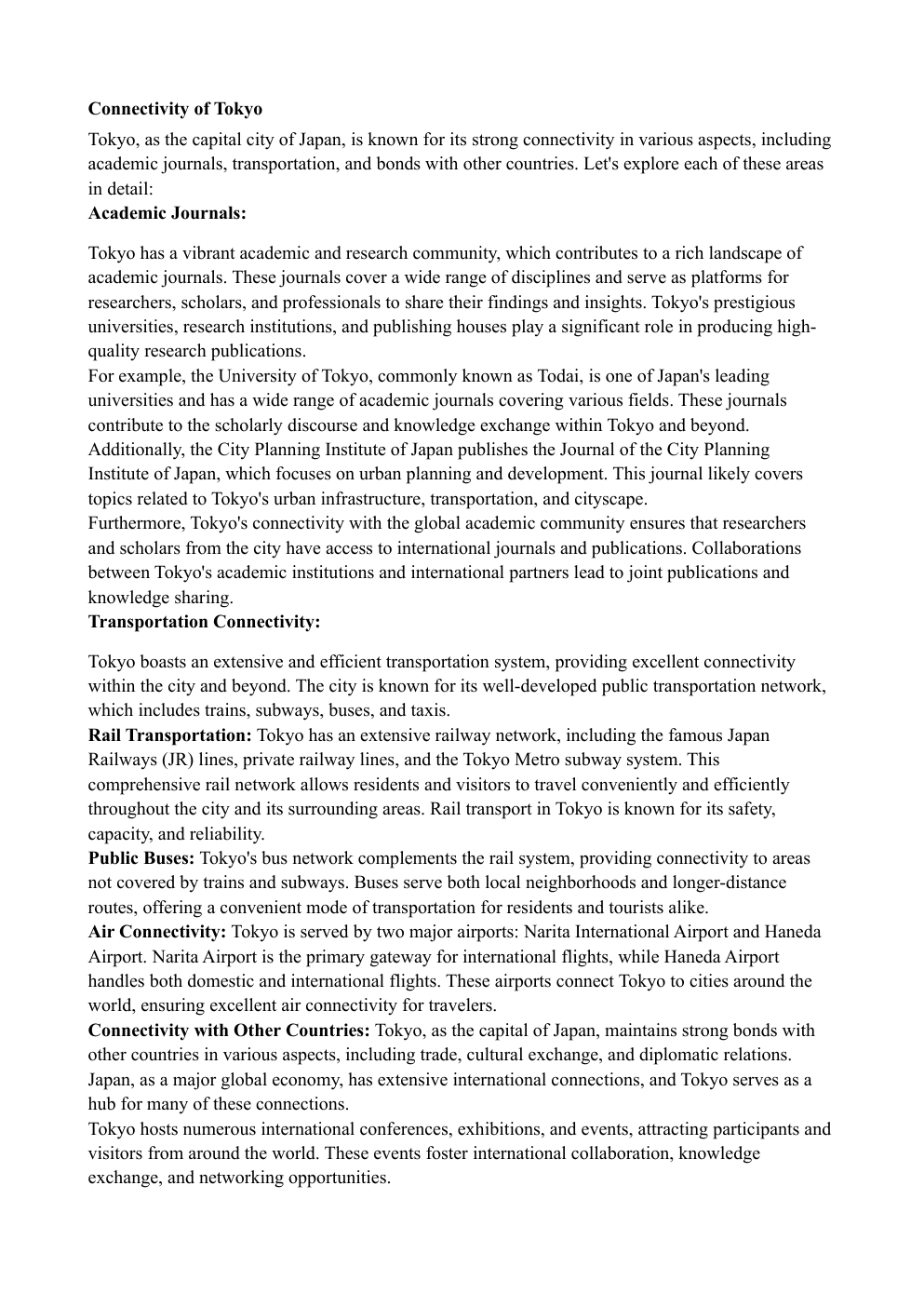Connectivity of Tokyo
Publié le 07/11/2023
Extrait du document
«
Connectivity of Tokyo
Tokyo, as the capital city of Japan, is known for its strong connectivity in various aspects, including
academic journals, transportation, and bonds with other countries.
Let's explore each of these areas
in detail:
Academic Journals:
Tokyo has a vibrant academic and research community, which contributes to a rich landscape of
academic journals.
These journals cover a wide range of disciplines and serve as platforms for
researchers, scholars, and professionals to share their findings and insights.
Tokyo's prestigious
universities, research institutions, and publishing houses play a significant role in producing highquality research publications.
For example, the University of Tokyo, commonly known as Todai, is one of Japan's leading
universities and has a wide range of academic journals covering various fields.
These journals
contribute to the scholarly discourse and knowledge exchange within Tokyo and beyond.
Additionally, the City Planning Institute of Japan publishes the Journal of the City Planning
Institute of Japan, which focuses on urban planning and development.
This journal likely covers
topics related to Tokyo's urban infrastructure, transportation, and cityscape.
Furthermore, Tokyo's connectivity with the global academic community ensures that researchers
and scholars from the city have access to international journals and publications.
Collaborations
between Tokyo's academic institutions and international partners lead to joint publications and
knowledge sharing.
Transportation Connectivity:
Tokyo boasts an extensive and efficient transportation system, providing excellent connectivity
within the city and beyond.
The city is known for its well-developed public transportation network,
which includes trains, subways, buses, and taxis.
Rail Transportation: Tokyo has an extensive railway network, including the famous Japan
Railways (JR) lines, private railway lines, and the Tokyo Metro subway system.
This
comprehensive rail network allows residents and visitors to travel conveniently and efficiently
throughout the city and its surrounding areas.
Rail transport in Tokyo is known for its safety,
capacity, and reliability.
Public Buses: Tokyo's bus network complements the rail system, providing connectivity to areas
not covered by trains and subways.
Buses serve both local neighborhoods and longer-distance
routes, offering a convenient mode of transportation for residents and tourists alike.
Air Connectivity: Tokyo is served by two major airports: Narita International Airport and Haneda
Airport.
Narita Airport is the primary gateway for international flights, while Haneda Airport
handles both domestic and international flights.
These airports connect Tokyo to cities around the
world, ensuring excellent air connectivity for travelers.
Connectivity with Other Countries: Tokyo, as the capital of Japan, maintains strong bonds with
other countries in various aspects, including trade, cultural exchange, and diplomatic relations.
Japan, as a major global economy, has extensive international connections, and Tokyo serves as a
hub for many of these connections.
Tokyo hosts numerous international conferences, exhibitions, and events, attracting participants and
visitors from around the world.
These events foster international collaboration, knowledge
exchange, and networking opportunities.
Moreover, Tokyo's universities and research institutions often collaborate with international
partners, leading to joint research projects, academic exchanges, and publications.
These
collaborations contribute to the global connectivity of Tokyo's academic community.
In terms of trade, Tokyo plays a crucial role in Japan's economy.
The city is home to many
multinational corporations and serves as a center for international business activities.
Tokyo's ports
and airports facilitate the import and export of goods, ensuring strong connectivity with other
countries.
Diversity in Tokyo
Tokyo, as a cosmopolitan city, exhibits a certain level of diversity in terms of ethnicity and
backgrounds.
While Japan is known for its ethnically homogenous population, Tokyo stands out as
a melting pot where people from various backgrounds coexist.
Let's delve into the diversity of
Tokyo in more detail:
Ethnic Diversity: The majority of the population in Tokyo is ethnically Japanese, specifically the
Yamato Japanese, who have been the predominant group since ancient times 1.
However, Tokyo is
also home to other ethnic groups, including:
•Ainu: The Ainu are an indigenous ethnic group primarily from Hokkaido, but some
individuals and communities can also be found in Tokyo.
The Ainu have their distinct
language, culture, and traditions.
•Ryukyuan People: The....
»
↓↓↓ APERÇU DU DOCUMENT ↓↓↓


